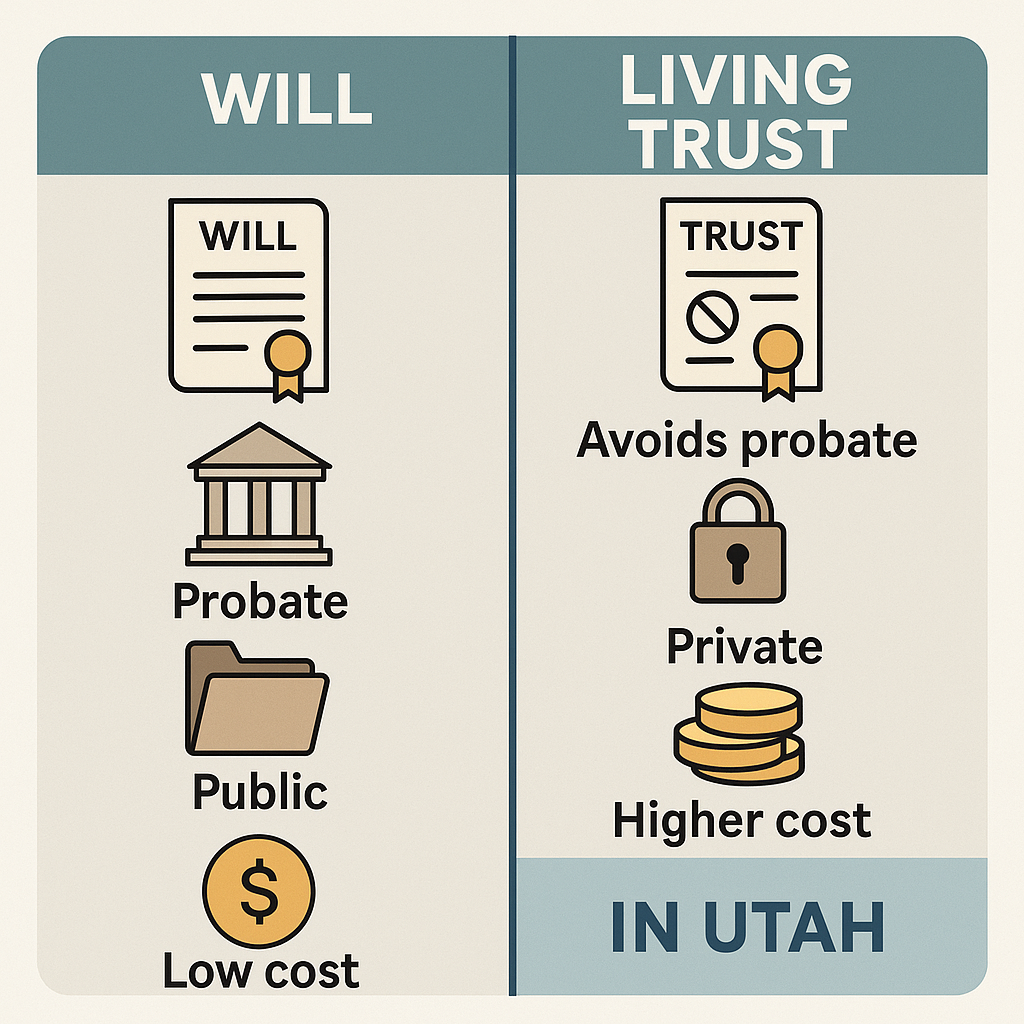Will vs. Living Trust in Utah What to choose and why
Plain-English guide to how wills and living trusts work in Utah, including probate, privacy, costs, funding, and a simple decision checklist
Utah Law Explained makes estate planning practical for Utah families. If you want control over what happens to your assets, you will hear two terms a lot: will and living trust. They are both valid tools but they work very differently.
This page explains how each tool works under Utah law, how they affect probate, privacy, costs, and day to day management, and gives you a clear checklist to help you choose with confidence.
Will vs. Living Trust — The Basics
Here is how the two options compare in plain English.
What a Will Does
A will is a written document that directs who gets your property after death. It takes effect only after you die and it goes through Utah probate court.
What a Trust Does
A living trust is a legal entity you set up now. You place assets in the trust and name beneficiaries. A funded trust often passes assets outside probate.
Probate and Privacy
Wills are filed with the court and become public. A properly funded trust is handled in private by a successor trustee with no court file.
Cost and Effort
Wills are cheaper up front but heirs face probate costs and delays. Trusts cost more to set up and fund but can save time and fees later.
Control and Incapacity
Wills do not help during life. Trusts can name a backup trustee to manage assets if you become unable to do so.
Feature Comparison
Many Utah plans use both: a living trust for major assets plus a simple will to catch anything missed.
Funding a Living Trust
What Funding Means
Utah Funding Checklist
Costs and Complexity
Common Myths
Only the wealthy need a trust
Middle income families benefit too, especially to avoid probate and keep things private.
A will avoids probate
In Utah, wills are filed with the court. A funded trust is the tool that can avoid probate.
Trusts are too hard to manage
Once funded, they are straightforward. The key is to keep titles and beneficiaries current.
You must choose only one
Most Utah plans use both. Trust for major assets and a will as a safety net.
Decision Checklist
List Your Assets
Homes, land, bank accounts, investments, business interests, insurance, retirement.
Set Goals
Do you want privacy, speed, and fewer court steps for your heirs. If yes, lean trust.
Match Tool to Estate
Simple estate or early stage family. A will plus good beneficiary designations may be enough.
Plan for Incapacity
Trusts can name a successor trustee. With will only, add powers of attorney for finances and health care.
Fund or Update
If you choose a trust, retitle assets now. If you choose a will, confirm all beneficiaries and pay on death designations.
Utah Video Hub — Wills and Trusts
YouTube Resources
Instagram Highlights
Key Takeaways
Wills are cheaper up front but go through Utah probate and become public.
Living trusts need funding now but often avoid probate and keep details private.
Many Utah families use both. Trust for major assets, will as a safety net.
This page is legal information, not legal advice. When in doubt, talk with a Utah estate planning attorney.
Need Help Choosing
Unsure which path fits your goals. A short consult can help you avoid mistakes and set up the right mix for your family.
Talk to a Utah AttorneyWe can discuss your assets, privacy goals, probate concerns, funding steps, and how to keep your plan current.
